The United Arab Emirates (UAE) stands as a beacon of progress, innovation, and cultural diversity in the heart of the Arabian Peninsula. With its rapidly growing economy, world-class infrastructure, and vibrant cultural scene, the UAE has emerged as a global hub for business, tourism, and cultural exchange.
From its humble beginnings as a pearl-diving and trading hub, the UAE has transformed into a modern and prosperous nation. Its strategic location at the crossroads of East and West has played a pivotal role in its economic success, while its commitment to sustainable development and cultural preservation has shaped its unique identity.
UAE Economic Overview
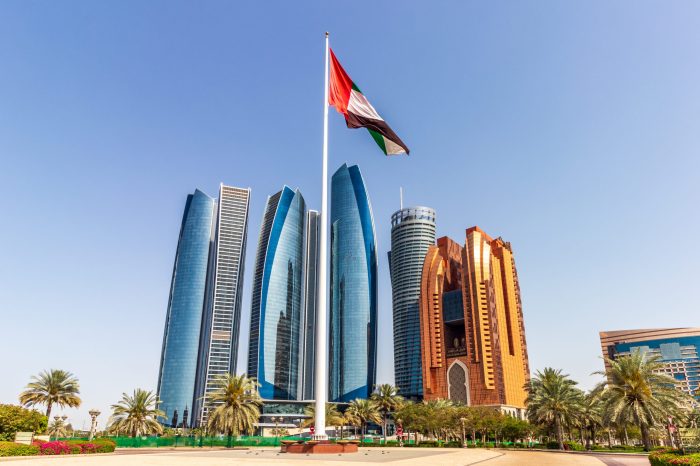
The United Arab Emirates (UAE) has a diversified economy, with oil and gas playing a significant role. In recent years, the government has implemented various economic reforms to reduce reliance on hydrocarbons and promote sustainable growth.The UAE’s GDP has grown steadily in recent years, reaching $414.1 billion in 2022.
The non-oil sector has been the primary driver of this growth, accounting for approximately 70% of GDP. Major sectors contributing to the non-oil economy include tourism, trade, manufacturing, and financial services.
UAE Tourism Industry

The United Arab Emirates (UAE) has emerged as a global tourism hub, attracting millions of visitors annually. With its iconic landmarks, pristine beaches, and vibrant culture, the UAE offers a diverse range of experiences for tourists.The country’s major tourist destinations include:
Dubai
Known for its towering skyscrapers, world-class shopping malls, and luxury hotels, Dubai is the most popular tourist destination in the UAE.
Abu Dhabi
The capital of the UAE, Abu Dhabi is home to cultural landmarks such as the Sheikh Zayed Grand Mosque and the Louvre Abu Dhabi.
Sharjah
Known as the “Cultural Capital of the UAE,” Sharjah offers a rich history, museums, and art galleries.
Ajman
A coastal emirate, Ajman is known for its pristine beaches and water sports activities.
Umm Al Quwain
A peaceful emirate, Umm Al Quwain is popular for its natural beauty and birdwatching opportunities.
Ras Al Khaimah
Known for its stunning mountain scenery and adventure activities, Ras Al Khaimah is an emerging tourist destination.
Fujairah
The only emirate on the eastern coast of the UAE, Fujairah offers beautiful beaches, scuba diving spots, and historic forts.The UAE government has implemented various strategies to promote tourism, including:
- Investing in infrastructure and developing new tourist attractions
- Launching marketing campaigns to raise awareness of the UAE as a tourist destination
- Facilitating visa-on-arrival for citizens of many countries
- Hosting major events and conferences to attract international visitors
As a result of these efforts, the UAE has seen a steady increase in tourist arrivals. In 2022, the UAE welcomed over 12 million tourists, generating revenue of over AED 115 billion (USD 31 billion). The key markets for tourism in the UAE include Saudi Arabia, India, China, the United Kingdom, and Russia.
UAE Infrastructure and Development
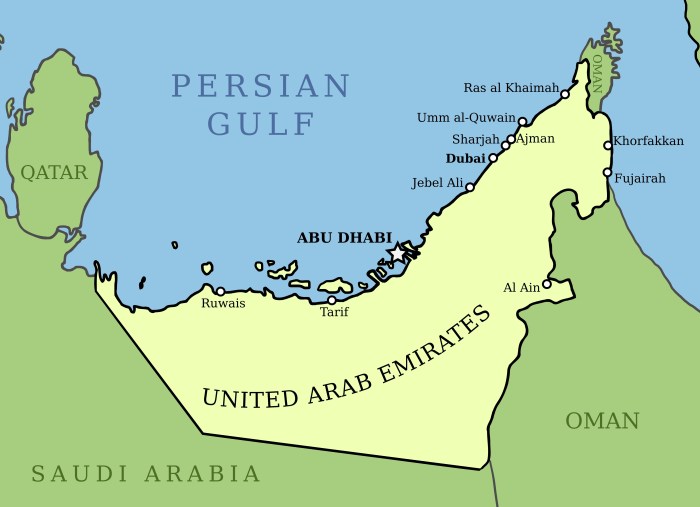
The UAE has invested heavily in infrastructure projects, including transportation, energy, and telecommunications, to support its economic growth and improve the quality of life for its residents. The government has also prioritized sustainable development, with plans to reduce its carbon footprint and promote renewable energy sources.
Transportation
The UAE has a modern and efficient transportation system, with a network of highways, railways, and airports. The country is also investing in public transportation, with plans to expand its metro and bus systems.
Energy
The UAE is a major producer of oil and gas, but it is also investing in renewable energy sources, such as solar and wind power. The country has set a target of generating 50% of its electricity from renewable sources by 2050.
Telecommunications
The UAE has a highly developed telecommunications infrastructure, with high-speed internet access available throughout the country. The government is also investing in 5G technology, which will provide even faster speeds and more reliable connections.
Sustainable Development
The UAE has adopted a number of policies to promote sustainable development, including:
- Investing in renewable energy sources
- Reducing water consumption
- Promoting waste recycling
- Protecting biodiversity
The government has also established a number of green building standards, which require new buildings to be energy-efficient and environmentally friendly.
Innovative Infrastructure Initiatives
The UAE is home to a number of innovative infrastructure initiatives, including:
- The Dubai International Airport, which is one of the busiest airports in the world
- The Burj Khalifa, which is the tallest building in the world
- The Palm Jumeirah, which is a man-made island in the shape of a palm tree
- The Masdar City, which is a sustainable city powered by renewable energy
These projects have helped to make the UAE a global hub for tourism, business, and innovation.
UAE Culture and Society
The United Arab Emirates (UAE) is a vibrant and diverse country with a rich cultural heritage and traditions. The country has undergone rapid modernization in recent decades, but its cultural roots remain strong. Islam plays a significant role in UAE society, shaping the country’s values, laws, and customs.
Cultural Heritage and Traditions
The UAE’s cultural heritage is influenced by its Arab and Islamic roots. Traditional Emirati culture emphasizes hospitality, generosity, and respect for elders. The country’s traditional music, dance, and cuisine are all expressions of its rich cultural heritage. Emirati cuisine is a blend of Arab, Persian, and Indian influences, and it is known for its use of spices and herbs.
Role of Islam in UAE Society
Islam is the official religion of the UAE, and it plays a significant role in society. The country’s laws are based on Islamic law, and Islamic values are reflected in many aspects of daily life. However, the UAE is a tolerant country, and other religions are freely practiced.
Cultural Diversity and Tolerance
The UAE is a multicultural society, with people from over 200 nationalities living in the country. The government has made efforts to promote cultural diversity and tolerance, and the country has become a hub for international cultural exchange. The UAE has hosted a number of cultural events, including the Dubai International Film Festival and the Sharjah International Book Fair.
UAE Foreign Policy
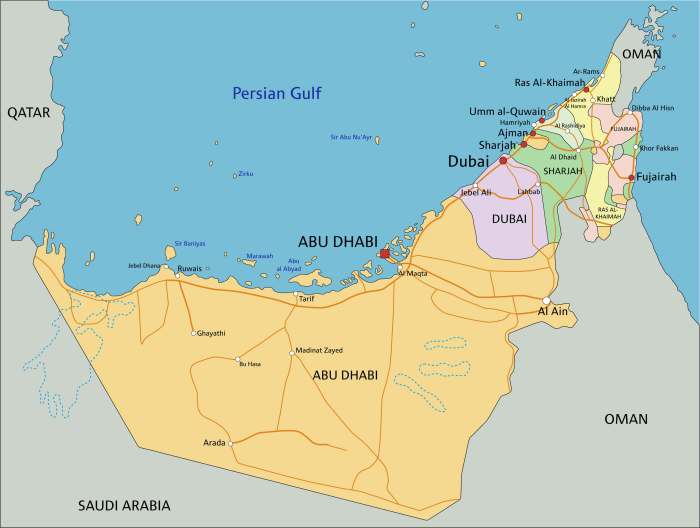
The United Arab Emirates (UAE) has a foreign policy that is based on the principles of peace, stability, and cooperation. The UAE seeks to promote regional and global security and to play a constructive role in international affairs.The UAE has a number of key alliances, including with the United States, the United Kingdom, and France.
The UAE is also a member of the Gulf Cooperation Council (GCC), the Arab League, and the United Nations.The UAE has played an active role in regional and global affairs. The UAE has been a major contributor to the fight against terrorism and has provided humanitarian assistance to countries in need.
The UAE has also been a vocal advocate for peace and dialogue in the Middle East.Some examples of the UAE’s diplomatic initiatives include:
- The UAE has been a key player in the efforts to resolve the conflict in Yemen. The UAE has provided financial and military support to the Yemeni government and has also helped to facilitate peace talks.
- The UAE has also been involved in the efforts to combat piracy off the coast of Somalia. The UAE has provided naval vessels to help protect shipping in the region.
- The UAE has been a strong supporter of the United Nations. The UAE has contributed to a number of UN peacekeeping missions and has also provided financial support to UN agencies.
UAE Healthcare System
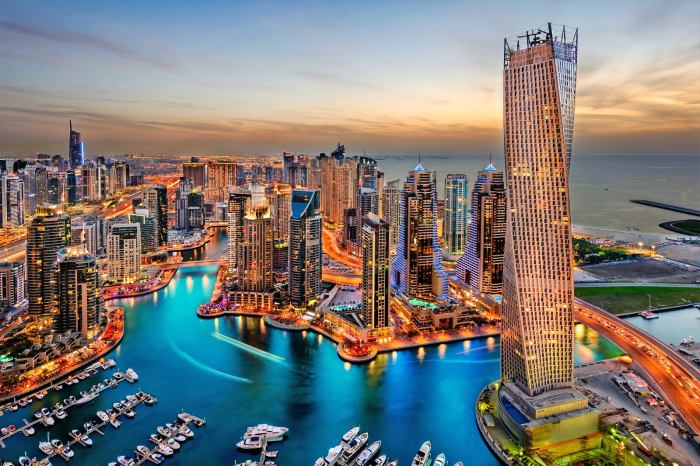
The United Arab Emirates (UAE) has made significant strides in developing a modern and comprehensive healthcare system that provides high-quality medical care to its citizens and residents. The system is characterized by its advanced infrastructure, highly skilled medical professionals, and a strong focus on preventive care.The UAE’s healthcare system is primarily funded by the government, which allocates a substantial portion of its budget to healthcare spending.
The system is overseen by the Ministry of Health and Prevention (MOHAP), which sets policies and regulations to ensure the quality and accessibility of healthcare services.
The United Arab Emirates (UAE) is a fascinating country with a rich history and a vibrant culture. Its stunning skylines and luxurious accommodations, like the Mercure Bandung Nexa Supratman , offer travelers an unforgettable experience. Whether you’re seeking adventure or relaxation, the UAE has something to offer everyone.
Healthcare Infrastructure
The UAE boasts a state-of-the-art healthcare infrastructure with modern hospitals, clinics, and specialized medical centers. These facilities are equipped with the latest medical technology and provide a wide range of services, including primary care, specialized treatments, and emergency care.The UAE also has a strong network of pharmacies that provide access to essential medications and over-the-counter products.
The United Arab Emirates is a fascinating country with a rich culture and history. While visiting the UAE, be sure to explore the stunning architecture, visit the vibrant souks, and experience the delicious local cuisine. If you’re looking for a more relaxing experience, consider taking a trip to Bali.
With its beautiful beaches, lush rainforests, and ancient temples, Bali is the perfect place to unwind and recharge. You can learn more about the best time to visit Bali here. And if you’re interested in learning more about the UAE, be sure to check out our other articles on the country.
Pharmacies are regulated by the MOHAP to ensure the quality and safety of medications.
Healthcare Professionals
The UAE’s healthcare system is staffed by a highly skilled and experienced team of medical professionals, including doctors, nurses, pharmacists, and other healthcare workers. Many of these professionals have received training in leading medical institutions around the world.The UAE actively recruits healthcare professionals from abroad to supplement its domestic workforce.
This has resulted in a diverse and highly competent healthcare workforce that provides a wide range of medical expertise.
Healthcare Policies and Initiatives
The UAE government has implemented a number of healthcare policies and initiatives to improve the quality and accessibility of healthcare services. These include:* Universal Health Insurance:The UAE has a mandatory health insurance system that covers all citizens and residents. This system ensures that everyone has access to essential healthcare services, regardless of their income or employment status.
Preventive Care
The UAE places a strong emphasis on preventive care, with a focus on promoting healthy lifestyles and early detection of diseases. The government has implemented a number of programs to encourage healthy eating, exercise, and regular health screenings.
Telemedicine
The UAE has embraced telemedicine as a way to improve access to healthcare services, particularly in remote areas. Telemedicine platforms allow patients to consult with doctors and other healthcare professionals remotely, using video conferencing and other technologies.
Healthcare Expenditure, Life Expectancy, and Common Health Conditions
The UAE has one of the highest healthcare expenditures per capita in the world. In 2020, the government spent an estimated 5.6% of its GDP on healthcare. This investment has resulted in a high-quality healthcare system that has contributed to a significant increase in life expectancy.The life expectancy in the UAE is among the highest in the world, with an average life expectancy of 81.3 years.
This is due in part to the country’s advanced healthcare system, as well as its high standard of living and low crime rates.The most common health conditions in the UAE include diabetes, heart disease, and cancer. These conditions are often linked to unhealthy lifestyles, such as poor diet, lack of exercise, and smoking.
The UAE government has implemented a number of programs to address these issues and promote healthy living.
UAE Education System
The United Arab Emirates (UAE) has undergone significant educational reforms and initiatives in recent years, aiming to improve the quality and accessibility of education for its citizens and residents. The education system in the UAE is structured into three main levels: primary, secondary, and higher education.
Primary Education
Primary education in the UAE is compulsory for all children aged 6 to 12. It consists of six years of study, with a focus on developing basic literacy and numeracy skills, as well as social and emotional development.
Secondary Education, Uae
Secondary education in the UAE is divided into two stages: middle school and high school. Middle school lasts for three years, and high school lasts for three years. Students can choose between general and vocational tracks in high school.
Higher Education
The UAE has a growing number of higher education institutions, including universities, colleges, and vocational training centers. These institutions offer a wide range of undergraduate and postgraduate programs in various fields. The government has also invested heavily in scholarships and financial aid programs to make higher education more accessible to Emirati students.
The United Arab Emirates, with its gleaming skyscrapers and vibrant culture, offers a captivating travel experience. While exploring this enchanting destination, don’t miss the opportunity to indulge in a luxurious stay at a singapore hotel. These establishments provide unparalleled comfort, world-class amenities, and breathtaking views, making them the perfect retreat after a day of exploring the UAE’s many wonders.
Literacy Rates and School Enrollment
The UAE has made significant progress in improving literacy rates and school enrollment. According to the World Bank, the adult literacy rate in the UAE is 96.5%, and the primary school enrollment rate is 99%. The government has set a target of achieving 100% literacy by 2025.
Government Education Reforms and Initiatives
The UAE government has implemented a number of education reforms and initiatives in recent years, including:* Establishing a new national curriculum that focuses on critical thinking and problem-solving skills
- Investing in teacher training and development
- Expanding access to early childhood education
- Providing scholarships and financial aid to Emirati students
- Encouraging innovation and research in higher education institutions
These reforms and initiatives are aimed at improving the quality and accessibility of education in the UAE, and preparing students for the challenges of the 21st century workforce.
Final Summary
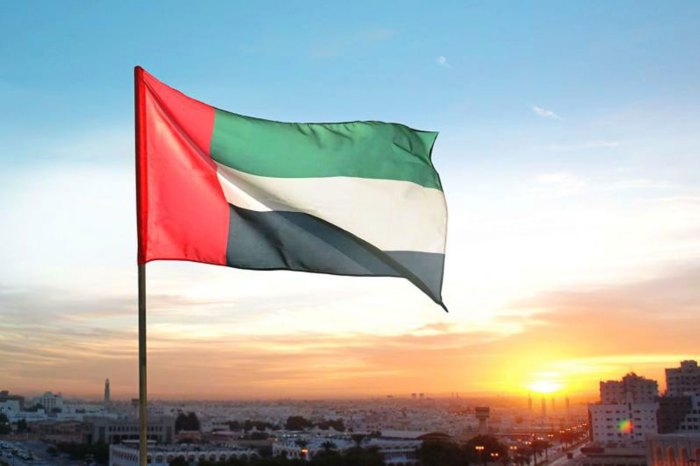
As the UAE continues to evolve, it is poised to play an increasingly significant role on the global stage. Its economic prowess, cultural diversity, and diplomatic initiatives make it a key player in shaping the future of the region and beyond.
FAQ Compilation
What is the official language of the UAE?
Arabic
What is the currency of the UAE?
Emirati Dirham (AED)
What is the national airline of the UAE?
Emirates
What is the tallest building in the world located in?
Dubai, UAE (Burj Khalifa)